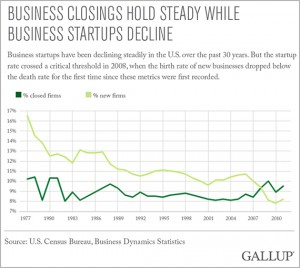This article takes a unique approach to the overuse of “entrepreneur” as a buzzword. This article is the interview of Daniel Isenberg on his book, Worthless, Impossible, and Stupid. In his book, Isenberg “argues that anything entrepreneurial–truly entrepreneurial–shouldn’t be perceived as valuable, feasible, or smart.” Rather, he claims entrepreneurism is about “seeing value where nobody else does” and that it is “contrarian”. Isenberg believes that society has confused entrepreneurism to mean startups – “that every entrepreneur is a startup and every startup is an entrepreneur”; “that every entrepreneur is innovative and most innovations are entrepreneurial”. In fact, as Isenberg notes, being an entrepreneur is more. It is “doing something that is out of the ordinary in terms of value creation. Entrepreneurs are creating extraordinary value by, in the most general sense, buying low and selling high. They’re beating the market by taking something that looks less valuable to everybody else.”
http://www.inc.com/adam-vaccaro/reclaiming-entrepreneurship.html

